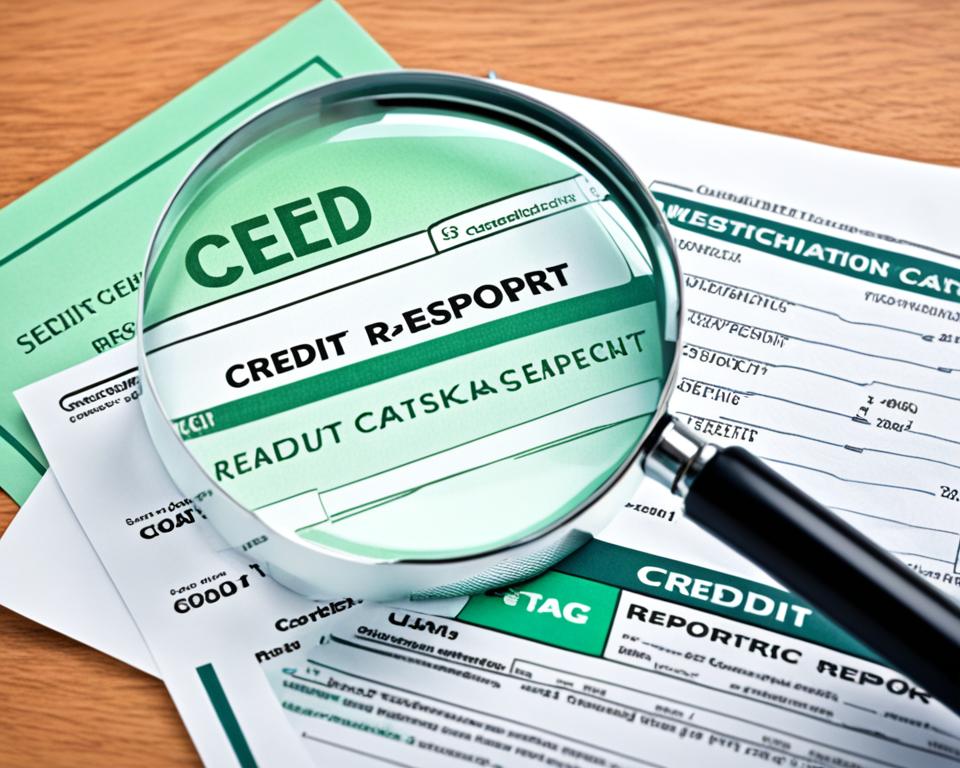Having a good credit score is essential for financial stability and accessing favorable lending opportunities. Whether you’re applying for a mortgage, car loan, or credit card, your credit score plays a significant role in determining your eligibility and the interest rates you receive.
Understanding the components that contribute to your credit score is key to improving it. Your credit report, credit history, and various factors can positively or negatively affect your score. By implementing proven strategies, you can take control of your credit score and pave the way for a brighter financial future.
Key Takeaways:
- Regularly review your credit reports to identify any errors or discrepancies.
- Make timely payments and avoid late payments to maintain a positive credit history.
- Keep your credit utilization ratio below 30% to demonstrate responsible credit usage.
- Be cautious when opening new credit accounts, as each application can temporarily lower your credit score.
- Manage your debts effectively and prioritize paying off high-interest debts first.
By following these tips, you can boost your credit score and position yourself for better financial opportunities. Stay tuned for the next sections where we explore more about understanding your credit score and creditworthiness, and the importance of regularly checking your credit score.
Understanding Your Credit Score and Creditworthiness
Having a clear understanding of your credit score and creditworthiness is essential for maintaining a healthy financial profile. In this section, we will explore key concepts such as the FICO score, credit rating, and credit monitoring. By gaining insights into these aspects, you can take proactive steps to improve your credit score and enhance your overall financial well-being.
Exploring the FICO Score
The FICO score is widely regarded as the industry standard for assessing an individual’s creditworthiness. It is a three-digit number that ranges from 300 to 850, with a higher score indicating a better credit profile. Lenders and creditors use this score to evaluate your creditworthiness and determine if you qualify for loans, credit cards, or other financial products. Your FICO score is calculated based on several factors:
- Payment History: Your track record of making on-time payments to creditors.
- Credit Utilization: The percentage of your available credit that you use.
- Length of Credit History: The age of your credit accounts and the average age of all your accounts.
- New Credit: The number of recently opened credit accounts and credit inquiries.
- Credit Mix: The variety of credit types you have, such as credit cards, loans, and mortgages.
Understanding these factors can help you identify areas for improvement and take the necessary steps to boost your credit score.
Determining Credit Ratings
Credit ratings provide a snapshot of your creditworthiness in a simplified format, making it easier for lenders to assess your financial reliability. These ratings categorize individuals into different credit score ranges, such as excellent, good, fair, or poor. While the exact criteria for determining credit ratings may vary among credit reporting agencies, it typically considers your FICO score, payment history, credit utilization, and other relevant factors.
Here’s a simplified breakdown of commonly used credit rating categories:
| Rating | Score Range |
|---|---|
| Excellent | 800 – 850 |
| Good | 670 – 799 |
| Fair | 580 – 669 |
| Poor | 300 – 579 |
It’s important to note that credit ratings can vary depending on the credit reporting agency and the scoring model used. However, understanding these general ranges can give you an idea of where you stand in terms of creditworthiness.
The Importance of Credit Monitoring
Credit monitoring plays a crucial role in maintaining a healthy credit profile. By regularly checking your credit score, you can stay updated on any changes, detect potential errors, and identify areas where you can improve. Monitoring your credit can also help you recognize signs of identity theft or fraudulent activity early on, allowing you to take immediate action to protect your financial well-being.
In today’s digital age, credit monitoring has become easier than ever. Many credit monitoring services offer real-time updates and alerts to keep you informed about any changes in your credit profile. These services can also provide personalized recommendations on how to improve your credit score based on your specific financial situation.
Improving Your Credit Score
If you’re looking to improve your credit score, there are several effective strategies you can implement:
- Make timely payments: Pay your bills and credit obligations on time to demonstrate reliable financial behavior.
- Reduce credit utilization: Keep your credit card balances low and strive to use only a small percentage of your available credit.
- Monitor your credit: Regularly check your credit score and credit reports to identify areas for improvement and address any errors or discrepancies.
- Maintain a diverse credit mix: Having a mix of credit types, such as credit cards, loans, and mortgages, can positively impact your credit score.
- Avoid excessive new credit: Limit the number of new credit applications you make, as too many inquiries within a short period can negatively affect your credit score.
By implementing these strategies and maintaining good financial habits, you can gradually improve your credit score and enhance your creditworthiness.
Now that you have a comprehensive understanding of your credit score and creditworthiness, it’s time to put your knowledge into action. Regularly monitoring your credit, staying proactive with payments, and following the tips provided will set you on the path to achieving a stronger credit profile. Take control of your financial future by taking control of your credit.

Conclusion
In conclusion, maintaining a good credit score is crucial for your financial well-being. A good credit score opens doors to lower interest rates, better loan and credit card options, and increased financial opportunities.
One of the key takeaways from this article is the importance of regularly accessing your free credit score. By keeping track of your credit health, you can stay informed about any changes or potential issues that may arise. This allows you to take proactive steps towards maintaining or improving your credit score.
Implementing the tips and strategies discussed in this article can help you take control of your credit score. Paying bills on time, keeping credit card balances low, and minimizing credit applications are just a few actions that can positively impact your creditworthiness.
Remember, a good credit score is not achieved overnight. It requires discipline, patience, and consistent financial habits. By focusing on building and maintaining a good credit score, you can position yourself for a brighter financial future and make the most of the opportunities that come your way.
FAQ
What is a credit score?
A credit score is a numerical representation of an individual’s creditworthiness, which is based on their credit history. It reflects their ability to repay debts and is commonly used by lenders to assess the risk of lending to a borrower.
How is a credit score calculated?
Credit scores are calculated using various factors, such as payment history, credit utilization, length of credit history, types of credit used, and recent credit applications. Each factor carries a different weightage, and credit scoring models, like the FICO score, use these factors to determine an individual’s creditworthiness.
What is a credit report?
A credit report is a detailed record of an individual’s credit history. It includes information about their credit accounts, payment history, outstanding debts, credit inquiries, and public records. Lenders and creditors use credit reports to assess an individual’s creditworthiness.
How often should I check my credit score?
To stay informed about your credit health, it is recommended to check your credit score at least once a year. Regularly monitoring your credit score allows you to identify any potential errors or discrepancies and take steps to improve your credit profile if needed.
What factors can affect my credit score?
Several factors can impact your credit score, including late or missed payments, high credit card balances, a short credit history, frequent credit applications, and defaults or bankruptcies. It’s important to manage these factors responsibly to maintain a good credit score.
How can I improve my credit score?
Improving your credit score involves several key steps, such as making timely payments, reducing credit card balances, avoiding new credit applications unless necessary, diversifying your credit types, and checking your credit report regularly for inaccuracies or discrepancies.
Can I get my credit score for free?
Yes, you can obtain your credit score for free from various reputable sources, including credit monitoring services, financial institutions, and credit reporting agencies. It’s important to review your credit score regularly to ensure its accuracy and to stay informed about your credit health.
How long does it take to improve a credit score?
The time it takes to improve a credit score depends on various factors, including the severity of past credit problems and the actions taken to improve credit management. Typically, it can take several months to a year or longer to see significant improvements in your credit score.





